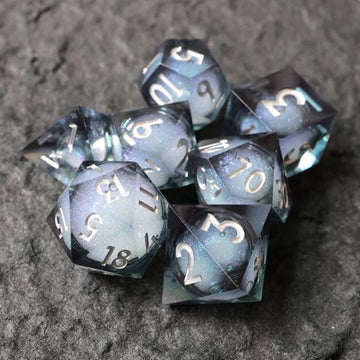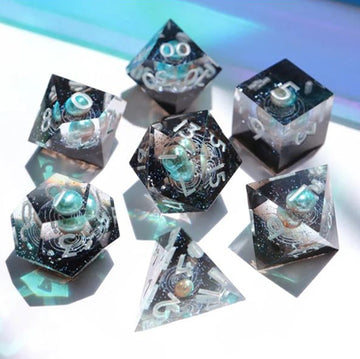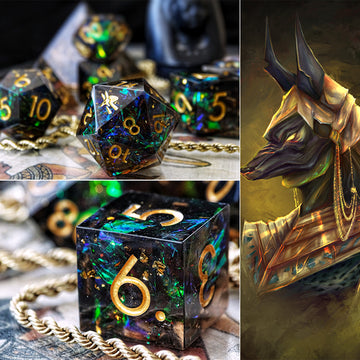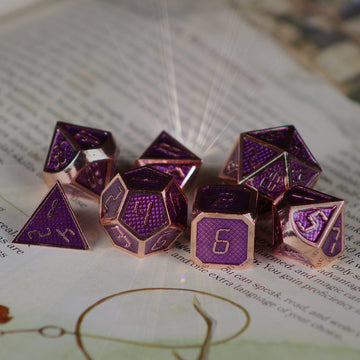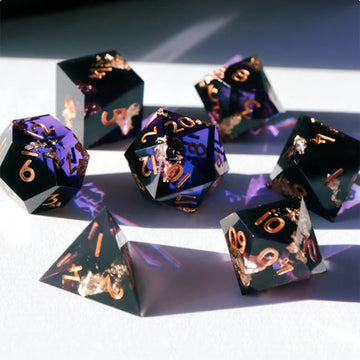Why DMs Sometimes Need to KILL Their Darling 5e Encounters and Campaigns
By Riley Rath
Dungeon Masters are the facilitator for every Dungeons and Dragons campaign. Being a DM is necessary, fun... but also a lot of hard work!
You, the DM, as an individual, are expected to wear several hats at once and juggle a variety of nuanced skills:
- Create balanced combat encounters that stay exciting from blade drawn to sheathed blade.
- Plan every environment of every realm so players not only have something to explore, but something fascinating to discover when they explore.
- And (inevitably...) transform into a unique NPC at the drop of a hat... preferably with a silly voice.
On top of that is story-telling theory, the art of evocative descriptions, and table social dynamics. And that's assuming they are using a module and not world building. If you throw in world building, it's like 10x more difficult and more work!
But that said... there is one other part of being a Dungeon Master that is very, VERY difficult... perhaps the most difficult of all...
It is something few people mention and no new DM expects. And a perfect example of what I am talking about happened a few months ago as my friends and I began a campaign...
We make DND blogs and DND Dice
Shop Our Inspired Sets Now
Now this group I meet with isn't interested in big, long campaigns. In their opinion, there are way too many adventure styles to play, too many BBEGs to slay, and too many magical realms to stay (in... couldn't resist the rhyme). To this day, they don't want to get bogged down following a character's growth or nuanced plot point... they have other adventures for that.
So instead we play "3-4 shots": 3-4 session adventures with divergent themes and tones. And this time around it was my turn to pick what we would play, and I knew exactly what I would choose. For months I had my eyes set on one setting... an homage to the most devastating battle in human history:
Shadowfell meets Stalingrad

|
 |
Images © Wizards of the Coast and Encyclopedia Britannica
(Quick history lesson: Stalingrad is considered the turning point of World War II, where hordes of Soviet Russians stopped the crushing tank tracks of Hitler's famed 6th Army at a city on the Volga River... Stalingrad).
In my brain, it was perfect in so many ways:
- The Shadowfell is a place of shadows... Stalingrad was reduced to black and grey rubble.
- The Shadowfell is a place of death... over 1.2 million Nazis, Soviets, and civilians died at Stalingrad (not wounded or missing... DIED).
- The Shadowfell is a barren ruin... the city of Stalingrad was bombed into a skeleton of its former glory.
- The Shadowfell fills visitors with despair... Stalingrad was a place devoid of hope.
- The Shadowfell is full of different domains... Stalingrad had distinct and infamous locations throughout the city.
The list goes on and on. We had just finished a silly, Oceans -11 heist, and the utter seriousness of a historical event seemed like the obvious next step.
But I didn't want to run this 3-4 shot because I enjoy educating my players as they wrestle with war atrocities (though I do like that a lot...). I also wanted them to be the shining bright lights of justice putting an end to such evil: badasses single-handedly turning the tide of battle.
I wanted a HIGH LEVEL campaign, something I had never run as a DM before.
So I told my players to create some level 18 characters. They were to be the full, complete, transformed heroes of their dreams. I even allowed them to equip their DnD character with one legendary and two rare magic items of their choice (and my approval...). One even got the Sword of Kas!
As they spent two weeks creating their god-level player characters, I had some refreshing to do. I spent hours re-reading a couple books. I listened to podcast episodes detailing the battle as I went about chores. I looked up primary sources for quotes I could use in the session.
I fully re-immersed myself in the horror of the battle to bring some 'historical realism' to the combat encounters.
Then I got to work on everything they would fight. I scoured 5e and past editions for anything that might live in the Shadowfell... anything that might follow the command of Vecna. I compiled a huge list and, knowing my players would be high level, dove into the Mob Combat Rules and created a cheat sheet for each low CR enemy.
I had the perfect way to start it off too: they would teleport into the Shadowfell at the "teleport station," i.e. the famed Stalingrad "tennis racket"/train station. From there they would make their way across the city, fighting through the chemical plant, tractor factory, and even help Pavlov fight wave after wave of undead from his house.

The night came and the session began. They bid goodbye to their respective allies and loved ones and resolutely stepped through the portal... and emerged in the midst of a ferocious firefight!
Shadar-kai warriors screamed orders at one another, desperately holding the line at the "teleport station." Waves of skeletons, ghouls, and zombie ogres advanced on their position. As we rolled initiative, I was so excited for this combat, to see what my players would do, to crossbreed DnD and WWII into something completely new!
"I roll 1d10 for damage," says the barbarian.
I'm immediately pulled out of my vision of the fun in store for us.
"What? There is no way... you should do, like, triple that at this point."
The warlock speaks up: "Yeah, my Eldritch Blast attack does just 1d10 damage."
Confused, I ask the other players a few questions... and it hits me:
None of them knew their characters.
Because they had not started small and worked their way up, they barely had a grasp of their basic attacks. It didn't matter that they had played DnD for years... this was their first time with these classes. It was like being back at square one.
I began to panic... and as I panicked, I had a moment of clarity as I looked at the battlefield... it was C-O-V-E-R-E-D in enemy NPCs. And not one of the players had an AOE spell.
"This battle was going to take forever," I thought. And honestly? I had so ignored CR that I had no idea if it would be a boring cakewalk or a TPK.
I sat there for about 5 minutes... frantically gazing at the battlefield, trying to come up with ANY other solution.
But one glance up at my quiet players, at their confused... and a little worried... faces told me all I needed to know. The answer was staring at me in the face. No amount of explanation would make this easier... no amount of retooling would make this fun.
So with a sigh of defeat, I just said "Ok... let's just scrap it, guys."
Their worried looks shifted to downright guilt, but I assured them it was fine, that it was even my fault. I laughed to myself a bit, leaned back, and asked:
"Ok... so what kind of campaign should we play instead?"
We Make DND Blogs and DND Dice
Shop Our Inspired Sets Now
There are tons of lessons DMs can draw from my failure. Some that come to mind include:
- Knowing your limits and learning one thing at a time
- Matching the right enemies for the right level of player characters
- Don't waste your time researching unless you are CERTAIN it will be played
- 'Historical Realism' is hard when one characer has the Orb of Dragonkind
Each of those are good, and soon will have their own story and blog post... but I want to focus on another lesson I took from this story:
Dungeon Master's sometimes need to "kill their darlings."
What do I mean by that?
The phrase is from a public speaking class I took in college. The professor noted that when you are crafting a speech, you inevitably stumble upon some line, or anecdote, or point that you just LOVE.
For whatever resaon, whether it is witty or brilliant, personally meaningful, or downright hilarious, you treasure this "darling."
But to the outside observer/the audience? This "darling" makes no sense within the framework of the speech. It doesn't hit home and distracts from the overall point. And as a speech writer, you will bend over backwards editing and editing, trying to keep it in and make it work.
But like a chicken at the chopping block, you gotta ax your darling out of the speech.
And sometimes... as DMs... we have to do the same thing. We need to look at the campaign from the player's perspective and ask: "Is this necessary? Will they enjoy this?"
AND IT IS SO HARD TO DO.
It's called a darling for a reason: it's precious to you! You desperately want to include it because it gets you excited, sparks your imagination, fulfills dreams.
Not only that, but you also feel you DESERVE it, after all that effort you put into planning, and all the work you have done for your table in the past. You think "My players owe me this!" And that's after you notice your darling... which is hard enough on its own!
The hardest part about being a Dungeon Master is letting go of your favorite elements that do not fit in the campaign.
For me, it was trying to get this group of players to play an immersive WWII "adventure," attempting to feel and relive the chaos of one of the most momentous battles in history. Is it possible within 5e's rules? Maybe, but I would need players who have all studied Stalingrad and are equally as excited as I am to help me find out.

Image © The New York Times
In this story, the whole campaign was my darling... but some darlings are a lot smaller:
- Maybe we have this amazing monster encounter in the woods, but the players choose to walk across the desert...
- Or maybe we have this wonderful NPC, but the players choose an entirely different plot line where they won't show up...
- Or maybe you design a wonderful dungeon, but halfway through you realize your particular table doesn't like a dungeon crawl at all...
Sure… you could just twist the plot and their adventure to force your darling in… and sometimes that works… but often it feels weird to the players, especially if they can tell it is forced.
It is just better to let your darlings go... save them for a different campaign... and craft an excellent adventure that you know everyone else will enjoy.
With that said... what is your darling?
Loved this story? We write more just like it.
Enter your email here to have every one sent
directly to your inbox.
Riley Rath

Riley is a freelance copywriter, content writer, and marketer based out of Spokane, WA. He is thankful to have the opportunity to combine his passion for imaginative role-playing to help FLGS, tabletop, board game, and D&D related businesses communicate their distinct value to players everywhere. When not playing or writing about board games or DnD, he is busy hiking, cooking, and gardening... very hobbit-like for a 6'4" dude.
Use this link if you are interested in his TTRPG and board game marketing support!




